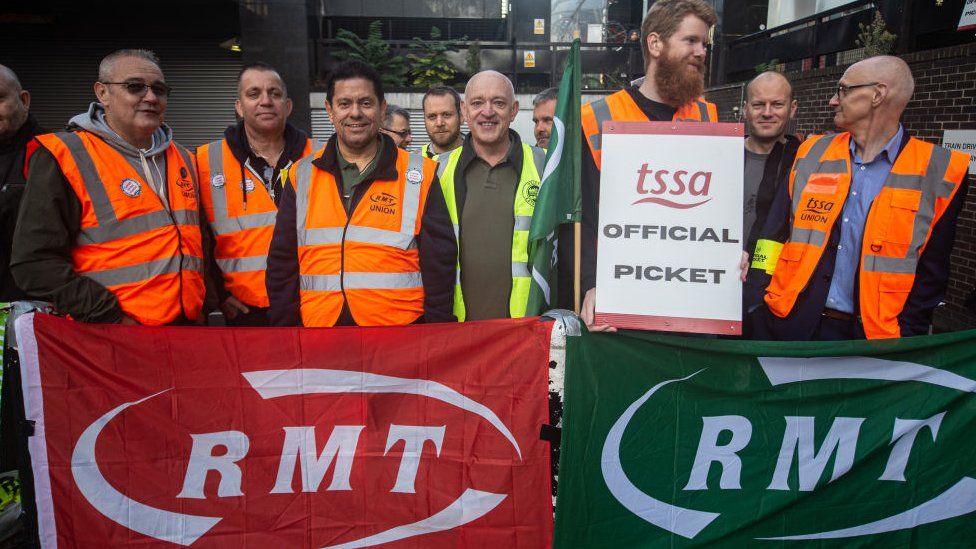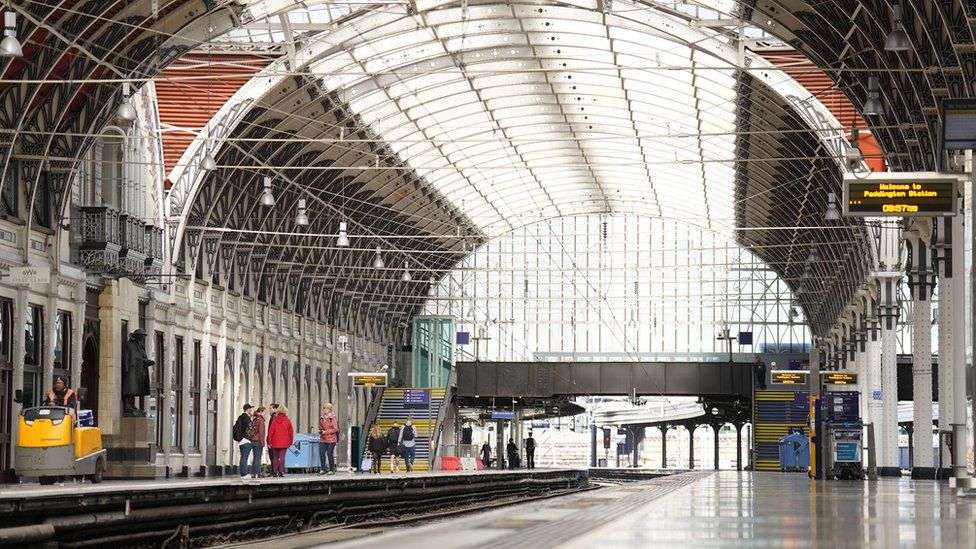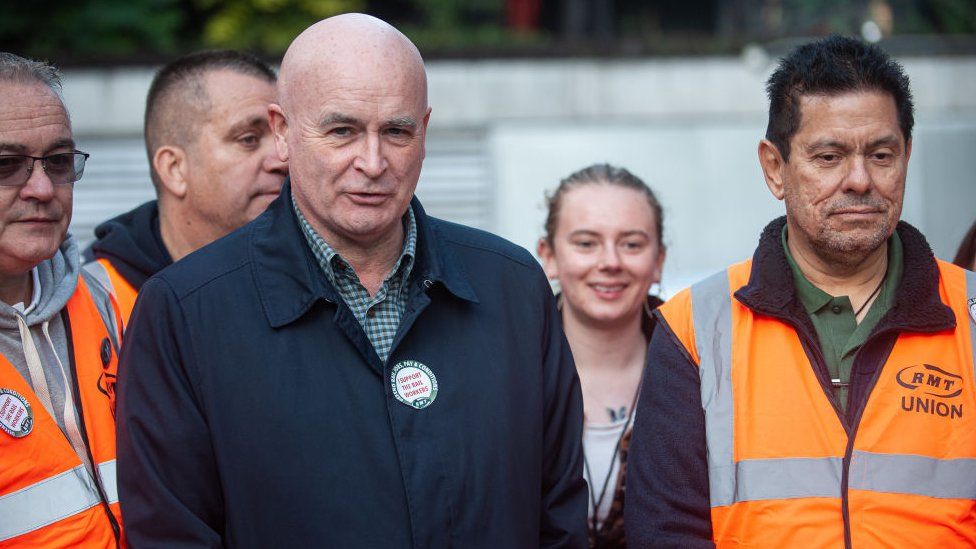
More than 50,000 workers are taking part in a strike which is causing the worst rail disruption of the year so far.
Members of four unions are staging 24-hour walkout in a long-running dispute over pay, jobs and conditions.
It means only 11% of usual train services are running, with large areas of the UK with no services at all.
Unions say there is little progress in resolving disputes, while rail bosses want pay to be linked to modernisation.
It is the first time the four unions - RMT, Aslef, Unite and the TSSA - have walked out on the same day. The co-ordinated action involves about 54,000 members, meaning services are more disrupted than on previous strike days when only one or two unions were striking.
Large parts of the network have virtually ground to a halt with only about one in 10 services running, and trains starting later and finishing earlier than usual.
No trains are running between London and major cities including Edinburgh, Brighton and Newcastle.
Some operators including Northern, Avanti West Coast and Southeastern are not running any trains for the entire day.
In Scotland, ScotRail will only run 20% of services between 07:30 BST and 18:30 in the central belt, Borders and Fife, with no trains running elsewhere on the ScotRail network.
Many who had planned journeys to the capital for the London Marathon are having to rethink their plans. Those running the major charity fundraising event have to collect their event pack at ExCel London by the end of Saturday.
Most services on Sunday will start later than usual following Saturday's disruption, but London Marathon said Southeastern trains would get passengers to the start line on time.
The strike will also affect delegates travelling to and from the Conservative party conference, which begins on Sunday, as well as thousands of people heading to football matches and other events.

'It's hitting normal people'

Karen Andrews from Staffordshire is raising money for her local hospital's breast care unit, where she was treated for cancer.
She was meant to travel down by train on Saturday, but when the strike was announced, "everything was thrown into disarray".
"I've not slept very well since I knew that we were affected," she said. "And every morning when I've woken up I've thought how are we going to work this out."
She could not take time off work, but her husband decided to go to London during the week to collect her race pack. He will now be driving her down on Saturday.
"I understand people wanting pay rises, of course, but it's hitting normal people".

Speaking from a picket line at London's Euston Station, RMT general secretary Mick Lynch said: "We haven't targeted the London Marathon, we've more targeted the Tory conference - if we're honest with you - because they're the people responsible for this mess."
He apologised for the inconvenience caused to people, saying they would much rather have a settlement.
But he said members had to keep going with the dispute, which has lasted nearly six months, adding he believed workers had the public's full support.
Next week members would be balloted again on further strikes, he added. The six-month mandate for strikes runs out at the end of November.

Eli Skipper, an ambulance responder based in Leicester, is among the many shift workers affected by the action. She told BBC News she has had to cancel her scheduled work as she is unable to get to the event in Nottingham. Further strike action on 8 October means she has also had to cancel next Saturday's shift.
"This is a large loss of earnings for me, particularly in the current crisis - with rising cost of living - and on top of two shifts cancellations due to the Queen's funeral." said Eli, 27
But she added: "I support the strikes. I understand what people are standing for. The government needs to listen to the unions.
"Some of their concerns are about safety, so it's not just about wages."
'Pushing passengers away'
The RMT union expects more than 40,000 of its members who work at Network Rail and 16 train companies will not show up for work.
Joining them are 9,000 train drivers who are members of Aslef, working at 12 train companies. Heathrow Express, the fast service between London Paddington and the airport, is suspended.

The TSSA also expects about 5,000 of its staff to walk out. A few hundred members of the Unite union have strike action scheduled too.
The Aslef union also plans a train drivers' strike on 5 October, with another RMT walkout scheduled for 8 October.
The Department for Transport said disruption over the weekend would "push passengers further away" and called on union bosses to reconsider.
The new Transport Secretary, Anne Marie Trevelyan, has so far met the general secretaries of both Aslef and the RMT, which had been described as a "good start".
Mick Whelan, general secretary of Aslef, said the train drivers' union would continue with talks and remained optimistic.
But he told BBC Breakfast: "We're not very close at all - but again, every time we meet there's an opportunity for something else on the table."
Aslef says many drivers are effectively being given a pay cut because of the rising cost of living.

Rail bosses have consistently said they do want to give a pay rise.
There is pressure to save money due to the pandemic, when the government effectively took control of the railway, and billions of taxpayers' money was poured in to keep services going.
With travel patterns changed, the industry argues reforms are necessary to prevent taxpayers or farepayers having to put in more money.
Network Rail, which maintains the tracks and signalling systems, is pressing ahead with trying to implement changes to how its maintenance teams work. They were proving a sticking point in negotiations and could mean job losses.
The RMT rejected the latest pay offer of 4% in the first year, plus another 4% in the second year, conditional on reforms. Other benefits like discounted rail travel were included.
But Network Rail has repeatedly called on the union to allow members to vote on the offer.
Its chief executive Andrew Haines told the BBC he thought it was a "decent package" and there was a balance needed between protecting jobs and ensuring the growth of the railway system.
Royal Mail workers are also on picket lines outside delivery and sorting offices, on the second day of their 48-hour strike, in a dispute over pay and conditions.
Communication Workers Union members also plan to strike for 24 hours from 04:00 on 13, 20, and 25 October and 28 November.
These walkouts will hit the peak postal build-up to Christmas including Black Friday week and Cyber Monday.
It said its "significant announcement" on dates reflects the "level of anger" workers feel. But the Royal Mail Group said further strikes would make its financial position worse and threaten workers' job security.

Have you been affected by the current train strikes? You can share your experience by emailing: haveyoursay@bbc.co.uk.
Please include a contact number if you are willing to speak to a BBC journalist. You can also get in touch in the following ways:
- WhatsApp: +44 7756 165803
- Tweet: @BBC_HaveYourSay
- Or fill out the form below
- Please read our terms & conditions and privacy policy
If you are reading this page and can't see the form you will need to visit the mobile version of the BBC website to submit your question or comment or you can email us at HaveYourSay@bbc.co.uk. Please include your name, age and location with any submission.

https://news.google.com/__i/rss/rd/articles/CBMiLGh0dHBzOi8vd3d3LmJiYy5jby51ay9uZXdzL2J1c2luZXNzLTYzMDg3NjIx0gEwaHR0cHM6Ly93d3cuYmJjLmNvLnVrL25ld3MvYnVzaW5lc3MtNjMwODc2MjEuYW1w?oc=5
2022-10-01 12:16:10Z
1586795161
Tidak ada komentar:
Posting Komentar